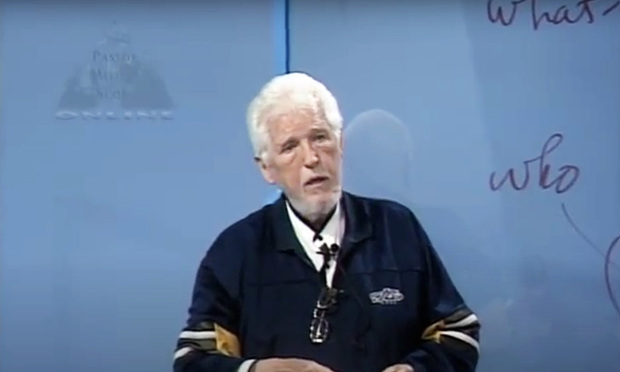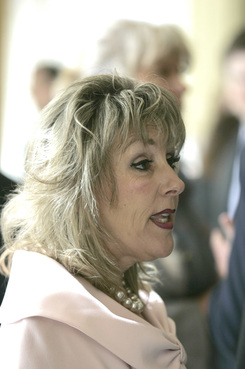Dr. Eugene Scott's 'Dream' Could Become Attorney Fee Nightmare
A Georgia minister who sued for a declaratory judgment that famed TV preacher Eugene Scott abandoned his copyrights might have to pay up to $307,000 in attorney fees, the Ninth Circuit rules.
May 13, 2020 at 08:08 PM
4 minute read
 Dr. Eugene Scott
Dr. Eugene ScottA declaratory judgment action for copyright abandonment can give rise to fee shifting under the Copyright Act, the U.S. Court of Appeals for the Ninth Circuit ruled in a case of first impression Wednesday.
Doc's Dream v. Dolores Press means that a Georgia minister's company that rebroadcasts the sermons of TV preacher Eugene Scott could be on the hook for up to $307,000 in attorney fees.
"We hold that, even when asserted as a claim for declaratory relief, any action that turns on the existence of a valid copyright and whether that copyright has been infringed invokes the Copyright Act, and thus attorney's fees may be available pursuant to Section 505," Judge Consuelo Callahan wrote for a unanimous panel.
The case is part of a "litany of claims, counterclaims, and motions" over the rights to the televised sermons of Eugene Scott, which started in the Los Angeles area in the 1970s and eventually were broadcast throughout North America as part of a 24-hour-a-day religious network.
Scott licensed Dolores Press Inc. to distribute his works in 1995, with profits going to his Wescott Christian Center and Faith Center. During that time he made his works available for online viewing and, according to plaintiffs in the case, "encouraged his followers and the public at large to freely download, reproduce, and distribute an archive of his works."
On his death in 2005 Scott bequeathed his copyrights to his widow, Melissa Scott, who continued the licensing arrangement with Dolores Press.
Georgia minister Patrick Robinson asked Melissa Scott for permission to share the works with his students online. Though Scott refused, Robinson moved ahead anyway with a website to share the works. According to the Ninth Circuit, Robinson said his goals were "to stick it to the devil" and "get the ball rolling in this legal matter."
 Ninth Circuit Judge Consuelo Callahan
Ninth Circuit Judge Consuelo Callahan"Robinson succeeded in the latter," Callahan wrote. Dolores Press sued for copyright infringement and Robinson's company, Doc's Dream, sued for a declaration that Scott had abandoned his copyrights before his death. U.S. District Judge Manuel Real of the Central District of California granted summary judgment for Dolores Press that there had been no abandonment, and Dolores and Melissa Scott moved for $307,000 in fees.
Real denied the motion. With no case law on the subject, Real looked to the Nimmer on Copyright treatise and concluded that because Robinson's suit for a declaration of copyright abandonment didn't require construction of the Copyright Act, a fee award was outside its scope.
Callahan, who was joined by Ninth Circuit Judges John Owens and U.S. District Judge Edward Korman, visiting from New York, ruled that even under the logic of the Nimmer treatise, fees would be available. Nimmer states that the Copyright Act would have to be construed in "a case in which E sues F for a declaration that the work in question falls outside the scope of copyright protection."
That hypothetical is "nearly identical to this case," Callahan wrote.
"We read Section 505, as does Nimmer, to allow the discretionary award of attorney's fees in any action where the scope of the copyright is at issue," Callahan wrote. And it would be "difficult—if not impossible—to properly evaluate an intellectual property creator's alleged abandonment without invoking the Copyright Act."
U.S. District Judge Percy Anderson has now taken over the copyright litigation from Real, who died last June. The Ninth Circuit instructed him to consider whether an award of fees to Dolores Press and Scott would be appropriate under the Fogerty factors.
In a separate order Thursday, the Ninth Circuit awarded fees on appeal to Dolores Press and to Scott. The court referred the case to Appellate Commissioner Peter Shaw to determine an amount, reviewable by the court.
The appellate win goes to Manatt Phelps & Phillips partner Benjamin Shatz; Kevin Leichter and Andrew Hewitt of The Leichter Firm; and Mark Lee of Rimon, all of whom represented Dolores Press and Melissa Scott.
Doc's Dream was represented by the Digital Business Law Group of Palm Harbor, Florida.
This content has been archived. It is available through our partners, LexisNexis® and Bloomberg Law.
To view this content, please continue to their sites.
Not a Lexis Subscriber?
Subscribe Now
Not a Bloomberg Law Subscriber?
Subscribe Now
NOT FOR REPRINT
© 2025 ALM Global, LLC, All Rights Reserved. Request academic re-use from www.copyright.com. All other uses, submit a request to [email protected]. For more information visit Asset & Logo Licensing.
You Might Like
View All
Reality TV Couple and Pacific Palisades Neighbors Sue City of Los Angeles Over Loss of Homes to Fire
3 minute read
Poop-Themed Dog Toy OK as Parody, but Still Tarnished Jack Daniel’s Brand, Court Says
4 minute read
Netflix Music Guru Becomes First GC of Startup Helping Independent Artists Monetize Catalogs
2 minute readLaw Firms Mentioned
Trending Stories
- 1We the People?
- 2New York-Based Skadden Team Joins White & Case Group in Mexico City for Citigroup Demerger
- 3No Two Wildfires Alike: Lawyers Take Different Legal Strategies in California
- 4Poop-Themed Dog Toy OK as Parody, but Still Tarnished Jack Daniel’s Brand, Court Says
- 5Meet the New President of NY's Association of Trial Court Jurists
Who Got The Work
J. Brugh Lower of Gibbons has entered an appearance for industrial equipment supplier Devco Corporation in a pending trademark infringement lawsuit. The suit, accusing the defendant of selling knock-off Graco products, was filed Dec. 18 in New Jersey District Court by Rivkin Radler on behalf of Graco Inc. and Graco Minnesota. The case, assigned to U.S. District Judge Zahid N. Quraishi, is 3:24-cv-11294, Graco Inc. et al v. Devco Corporation.
Who Got The Work
Rebecca Maller-Stein and Kent A. Yalowitz of Arnold & Porter Kaye Scholer have entered their appearances for Hanaco Venture Capital and its executives, Lior Prosor and David Frankel, in a pending securities lawsuit. The action, filed on Dec. 24 in New York Southern District Court by Zell, Aron & Co. on behalf of Goldeneye Advisors, accuses the defendants of negligently and fraudulently managing the plaintiff's $1 million investment. The case, assigned to U.S. District Judge Vernon S. Broderick, is 1:24-cv-09918, Goldeneye Advisors, LLC v. Hanaco Venture Capital, Ltd. et al.
Who Got The Work
Attorneys from A&O Shearman has stepped in as defense counsel for Toronto-Dominion Bank and other defendants in a pending securities class action. The suit, filed Dec. 11 in New York Southern District Court by Bleichmar Fonti & Auld, accuses the defendants of concealing the bank's 'pervasive' deficiencies in regards to its compliance with the Bank Secrecy Act and the quality of its anti-money laundering controls. The case, assigned to U.S. District Judge Arun Subramanian, is 1:24-cv-09445, Gonzalez v. The Toronto-Dominion Bank et al.
Who Got The Work
Crown Castle International, a Pennsylvania company providing shared communications infrastructure, has turned to Luke D. Wolf of Gordon Rees Scully Mansukhani to fend off a pending breach-of-contract lawsuit. The court action, filed Nov. 25 in Michigan Eastern District Court by Hooper Hathaway PC on behalf of The Town Residences LLC, accuses Crown Castle of failing to transfer approximately $30,000 in utility payments from T-Mobile in breach of a roof-top lease and assignment agreement. The case, assigned to U.S. District Judge Susan K. Declercq, is 2:24-cv-13131, The Town Residences LLC v. T-Mobile US, Inc. et al.
Who Got The Work
Wilfred P. Coronato and Daniel M. Schwartz of McCarter & English have stepped in as defense counsel to Electrolux Home Products Inc. in a pending product liability lawsuit. The court action, filed Nov. 26 in New York Eastern District Court by Poulos Lopiccolo PC and Nagel Rice LLP on behalf of David Stern, alleges that the defendant's refrigerators’ drawers and shelving repeatedly break and fall apart within months after purchase. The case, assigned to U.S. District Judge Joan M. Azrack, is 2:24-cv-08204, Stern v. Electrolux Home Products, Inc.
Featured Firms
Law Offices of Gary Martin Hays & Associates, P.C.
(470) 294-1674
Law Offices of Mark E. Salomone
(857) 444-6468
Smith & Hassler
(713) 739-1250







